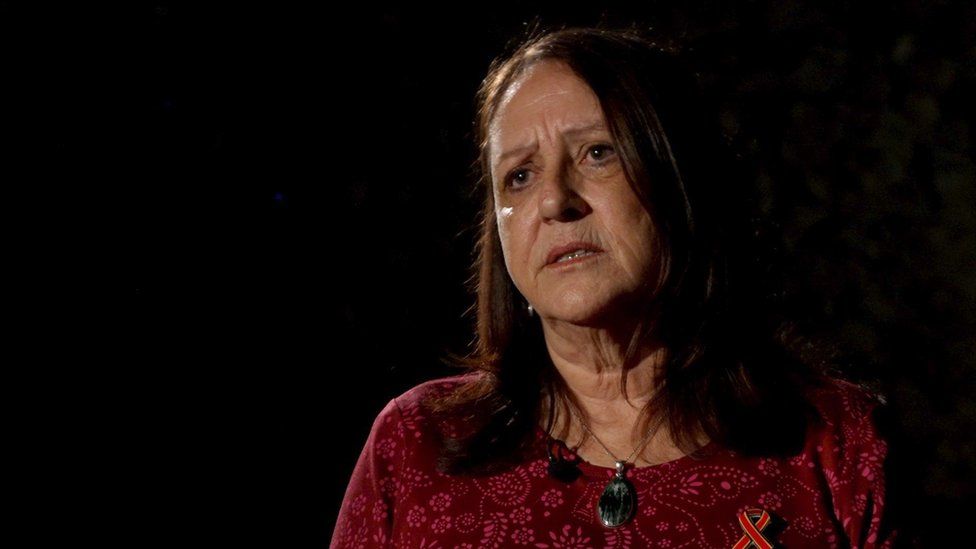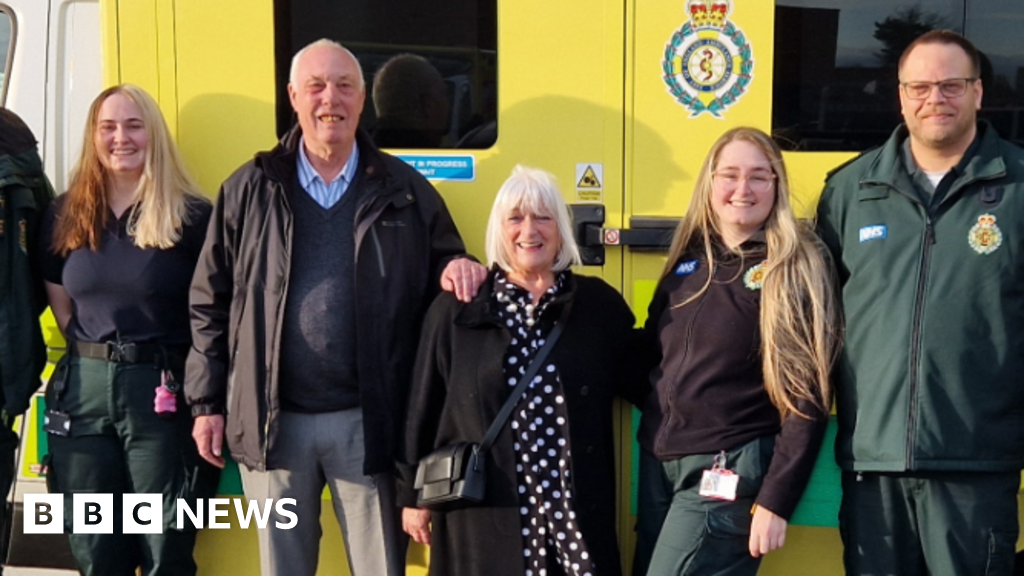
Jo Vincent was infected with hepatitis C in 1988 but not diagnosed until 2015
By Chloe Hayward and Hugh Pym
Health producer and health editor, BBC News
About 1,750 people in the UK are living with an undiagnosed hepatitis C infection after being given a transfusion with contaminated blood, according to BBC analysis.
Official documents, seen by BBC News, reveal how the UK government and the NHS failed to adequately trace those who were most at risk of having the virus.
They show how officials slowed detection rates and even sought to kept public awareness of the virus low.
Up to 27,000 people were exposed to hepatitis C after having blood transfusions in the 1970s, 80s and 90s.
The true scale of undiagnosed cases is based on BBC analysis of statistics submitted to the Infected Blood Inquiry by an expert panel, as well as Freedom of Information requests to infected blood support schemes.
Value for money
BBC News can reveal for the first time how the UK government and the NHS actively tried to limit the public's awareness of the virus to avoid embarrassing "bottlenecks" at liver units. Testing was limited because of "resource implications for the NHS".
"Raising awareness poses undoubted difficulties for the NHS," an internal government note from the 1990s says. "In terms of value for money, there may be better candidates for additional resources." The document has been added to the inquiry's website.
Rather than prioritising care for those harmed by NHS-provided blood, officials squeezed budgets as cost concerns took precedence over patient safety.
Even though it wasn't formally identified until 1989, health officials and NHS staff recognised that this form of hepatitis could be fatal as early as 1980.
But they chose to delay "look back" programmes until 1995, which further hampered efforts to track down people who may have been infected, reducing their chances of receiving treatment before permanent liver damage was caused.
As NHS funding for hepatitis remained limited, and awareness low, victims told BBC News how they felt doctors patronised and ignored them instead of offering tests and support.
Known as the "silent killer", hepatitis C may cause few symptoms initially, with early signs including night sweats, brain fog, itchy skin and fatigue. But for every year a person carries the virus, their chance of dying from liver cirrhosis and related cancers increases.
The infected blood scandal is one of the biggest treatment disasters in NHS history - 3,000 people who were infected with HIV and hepatitis C after being given contaminated blood products have died.
Many of the victims were haemophiliacs, who were given infected blood products as part of their treatment.
But many thousands more were given transfusions using contaminated blood after accidents, emergencies or childbirth.
The Hep C Trust says, on average, two people a month call its helpline following a diagnosis as a result of a blood transfusion more than 30 years ago. More often than not, they say their prognosis is dire.
'She weighed four stone when she died'
Maureen Arkley complained of stomach pain, years before her hepatitis C diagnosis
Victoria's mother, Maureen Arkley, was diagnosed with cirrhosis of the liver and hepatitis C in September last year.
By the following month, it was clear she had untreatable liver cancer.
Maureen had an operation in 1976 involving multiple blood transfusions. They were noted on her medical records, but at no stage was she contacted by her GP or anyone in the NHS about the fact she might have been exposed to hepatitis.
Years later, in 2008, she began having pains in her abdomen. Tests were eventually done in 2010, including an ultrasound but the consultant concluded nothing was wrong. She wasn't tested for Hep C.
Maureen passed away in February, five months after she was diagnosed - and 47 years after she had the blood transfusion that infected her.
"The end was utterly horrific, she weighed less than four stone when she died," says Victoria. She says her mother felt there was a stigma attached to the virus. "She was very ashamed and hid from it.
"I work in social care but we just didn't make the link there was a chance someone with a blood transfusion could have been infected with hepatitis C. Where was the public health campaign? Why didn't the doctor test her?
"They knew she had had transfusions, but no one tested her. I'm so angry," says Victoria.
Government documents
In 1973, a Blood Transfusion Service booklet was released warning of the risks of hepatitis. Over the next 20 years, it became common knowledge that blood transfusions carried the risk of infecting patients with hepatitis.
But, despite this, it was not until 1995 that the UK government began a look-back exercise to find people who may have been infected by contaminated blood transfusions decades earlier.
Other countries, including the US, started their process years before.
Hospital trusts were tasked with looking through medical records, but without funding, efforts were limited. Some people were traced but there was a postcode lottery when it came to treatments and counselling.
A year after the exercise began, an official report noted that "increased testing has resource implications for the NHS". One common treatment - known as Interferon - was "already placing a considerable burden on purchasers".
In another Department of Health document, submitted to the public inquiry, it said there was "an obligation to remind health professionals, and people who may have been infected".
But it added: "We have so far avoided going down this road because of the resource implications for the NHS. Raising awareness poses undoubted difficulties."
Today hepatitis C can be cleared by taking pills for 8-12 weeks.
'It's just menopause'
The majority (64%) of people infected with hepatitis C via blood transfusions were women. Stories of transfusions during childbirth and as a result of ectopic pregnancies were repeatedly heard by the BBC. Memories of dismissive doctors were recurrent.
Jo Vincent was infected with hepatitis C in 1988, after being given a transfusion following a postpartum haemorrhage. She soon developed symptoms but was offered antidepressants and sent to a psychiatrist. A doctor suggested she had an alcohol problem.
As the years went by, Jo was told her night sweats were down to the menopause. Brain fog was because of hormones. "The doctors just fobbed me off - they wouldn't listen."
Jo was finally diagnosed in 2015. After a six-week course of two tablets a day, she cleared the virus. But the damage was done - Jo has liver cirrhosis and now has six-monthly checks for the early signs of cancer.
Ronan is angry his mother Jane was not tracked down and tested for hepatitis C
Jane Fitzgerald died at the age of 53 from hepatitis C-related illnesses.
In 1978, she was given a single unit of blood after surgery, following an ectopic pregnancy. Over the following decades she brought up her two children and enjoyed family holidays and socialising with friends.
But as the new millennium came in, she felt tired, was having trouble swallowing and had a sore throat. Eventually, in 2004, blood tests were carried out and she was diagnosed with Hep C.
In the hunt for the best treatment Jane paid for trips to Paris so she could have scans on equipment the NHS hadn't invested in.
While in the NHS, she attended clinics with drug addicts and alcoholics.
As her liver function started to fail, Jane suffered from ascites - a build-up of fluid in her abdomen - that needed draining every 10 days.
Once, she attended an appointment, and after being made to wait the entire day, she was sent home. "That night her abdomen ruptured from the pressure," her son, Ronan, told the BBC. Jane died with liver cancer in November 2015.
"I am so angry still. She was given one unit of blood and at no stage did they try to trace her or warn her that she had this deadly disease," he says.
I gave my daughter Hep C
Annette was given a blood transfusion in 1985 after an ectopic pregnancy.
It wasn't until she moved to Australia in the 1990s, and was pregnant with her second child, that Annette found out she had hepatitis C. Days later, she was given the devastating news her young daughter was also infected.
The pair took long courses of Interferon - a drug known to have several physical and mental impacts on patients.
"I lost my hair, I fell to seven stone in weight and was suicidal. It was an awful drug," says Annette. Over the next decade, she took another two courses of treatment and eventually cleared her hepatitis C, in 2018.
She now has cirrhosis of the liver and varices - enlarged blood vessels in the oesophagus that make swallowing hard. She is still alive - unlike her daughter.
After failing to clear the virus, Annette's daughter fell pregnant. Within hours of giving birth, a bleed was detected. Doctors discovered she had cancer.
Annette's daughter died soon after her 28th birthday. She left behind her 16-month-old baby.
For many victims, the UK-wide infected blood inquiry has come too late. Announced in 2017, after years of campaigning by victim, it took evidence between 2019 and 2023 and will publish its final report on 20 May.
A government spokesperson said the infected blood scandal was "an appalling tragedy that never should have happened" and that a new body would be set up to deliver compensation once victims and claims had been assessed.
If you think you might have had a blood transfusion in the 1970s, 80 or 90s and have any concerns about your health, you can request a free NHS hepatitis C test at https://hepctest.nhs.uk
Once the form has been filled in, it will take a couple of days to arrive. It will come with clear instructions on how to do a finger-prick test and send back a sample. Results can take up to five days.
 (1).png)
 7 months ago
15
7 months ago
15













